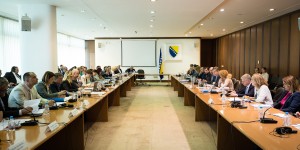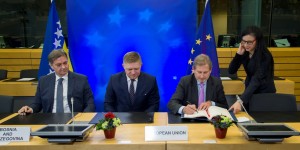Brussels, 8 July 2016
Representatives from the European Commission (Commission) and from Bosnia and Herzegovina (BiH) met in Brussels on 8 July 2016 to discuss the level of implementation of the SAA and of approximation of the country legislation to the EU acquis in the field of trade, industry, customs and taxation. The meeting was co-chaired for the EU by Mr Michael Aldaya from the Directorate General for Neighbourhood and Enlargement Negotiations (DG NEAR) of the European Commission, and for Bosnia and Herzegovina by Mr Dragiša Mekić from the BiH Ministry of Foreign Trade and Economic Relations.
During the meeting, developments in the area of free movement of goods were discussed, including legislative and institutional developments in standardisation, conformity assessment, accreditation, metrology, and market surveillance. In view of future participation in the EU single market, the Commission calls upon BiH to establish a fully functioning internal single economic area. This implies removing all unnecessary administrative, legal and technical barriers to the free movement of goods within the country. The Commission urges BiH to introduce a countrywide harmonised approach and to further strengthen the capacities, coordination and cooperation among all competent institutions. The adoption of a countrywide Strategy for Quality Infrastructure is of utmost importance. The Commission also invites BiH to ensure equal application of conformity assessment procedures throughout the whole country, and encourages BiH to make further efforts towards alignment with the EU acquis and repealing the conflicting domestic legislation.
The Commission welcomes the adoption of a BiH Strategic Development Framework 2016-2018 and the specific measures on developing industrial policy in BiH. State and entity-level documents need to be harmonised and upgraded to tackle issues such as competitiveness and improving the business environment, including removing obstacles to conduct business across entities’ borders. On SMEs, the Commission welcomes BiH’s signing of the EU COSME programme and encourages the country to swiftly proceed with ratification. The Commission also reiterates the need to complement the initiatives of entities and cantons with a country-wide coordinated SME strategy, in order to avoid market distortions, reduce administrative requirements, and ensure the equal treatment of economic operators throughout the country. The Commission encourages the country to move forward with the mutual recognition of business registration at entity level and to follow up the recommendations of the 2016 Small Business Act Assessment in the Western Balkans and Turkey.
On taxation, the Commission calls upon BiH to swiftly adopt the new VAT law and to ensure that any change to the law on excise duties go in the direction of alignment with the EU acquis. The Commission highlights the need for BiH to bring its excise duties on beer and on ethyl alcohol in line with the EU acquis, in order to avoid fiscal discrimination between domestic and international producers; this is an international obligation of BiH under the SAA. On customs, the Commission urges BiH to swiftly adopt the implementation bylaws for the 2015 Law on Customs Policy, and to ensure that electronic signature is functional and available for economic operators throughout the country. The Commission welcomes BiH’s ratification of its participation in the Fiscalis2020 and Customs2020 EU programmes and the implementation of Asycuda World throughout BiH.
On trade, the Commission welcomes the entry into force of the SAA and calls upon BiH to swiftly initial the Agreement on the Adaptation of the SAA to take into account the accession of Croatia that was reached at technical level on the basis of the principle of traditional trade. The adaptation of the SAA is necessary for further progress after BiH’s application for EU membership in February 2016, as well as for the automatic reinstatement of Autonomous Trade Measures (ATMs) on certain fruit and vegetable products. The Commission and BiH exchanged statistics on trade and welcome how the EU remains by far the first trade partner of BiH, with 82.7% of its bilateral trade. The trade balance between the EU and BiH improved in 2015: BiH exports to the EU increased by 5.5% while EU exports to BiH increased by 1.2%. BiH should prepare for the implementation of the CEFTA Additional Protocol V on Trade Facilitation – including by adopting a national Authorized Economic Operator programme – and of its liberalisation of trade in services. Finally, the Commission expresses its support and readiness to continue assisting BiH in its accession to the WTO and encourages BiH to quickly complete the necessary steps, including the accession to the UPOV Convention and the amendments to the FBiH Law on Internal Trade.



